Campus/People
-
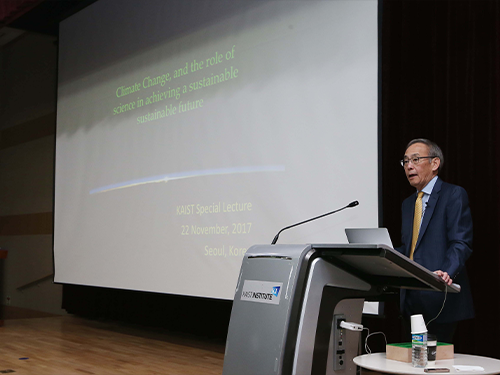 Dr. Steven Chu Talks on Sustainable Energy Policy at KAIST
Nobel Laureate in physics and former US Energy Secretary Steven Chu called for concerted efforts to develop a more sustainable energy policy and portfolio at a lecture held at KAIST and a forum in Seoul on November 23.
A policy with an energy mix including nuclear power and renewable energy could be ideal for retaining a stable energy supply given Korea’s very limited geographical conditions, Chu said during the Future Energy Forum in Seoul. He also held a lecture at KAIST’s Daejeon campus on “Climate Change, the Importance of Science and Policy in Achieving a Sustainable Future.”
He said that unlike the United States, Korea and Japan have geographical limitations for generating enough renewable energy. "Wind speeds of more than 10 meters per second would allow wind power generation, but, South Korea's southernmost wind speed in Jeju is less than 8 meters per second, and the amount of sunshine is lower than in the Middle East. It is ideal to combine renewable energy with nuclear power plants," he said.
Chu also stressed the role of science in achieving a sustainable future, citing many cases in foreign countries. For instance, Germany once decided to do away with nuclear power. However, their initial plan does not directly raise energy efficiency and the proportion of fossil fuels has led to an increase in the environmental issue of fine particular matter as well as carbon dioxide emission increases.
He said that in the long term, renewable energy will emerge as major alternative resources, stressing the role of science in achieving a sustainable future. Without this alternative, we will eventually burn more fossil fuels and pollute the air.
Chu also said that nuclear waste and safe plant operation will be a big concern, but it is technologically viable since Korea has already proven its prowess in nuclear power plant building and safety technology.
Chu added, "Research in chemical energy storage through novel electrochemistry may lead to solutions, but for the next half century we will need additional energy-on-demand and carbon-free sources of energy from proven technologies."
"While science, innovation and technology will no doubt lead to better solutions, sound government policies are needed to advance the transition to carbon-free energy needed to achieve a more sustainable world," he said.
After serving as the US Secretary of Energy for four years from 2009 to 2013, Professor Chu returned to Stanford University, and currently holds a position of the William R. Kenan, Jr. Professor of Physics as well as Professor in the Department of Molecular and Cellular Physiology.
Professor Chu is known for his research at Bell Labs and Stanford University regarding the cooling and trapping of atoms with laser light, for which he won the Nobel Prize in Physics in 1997.
2017.11.24 View 5192
Dr. Steven Chu Talks on Sustainable Energy Policy at KAIST
Nobel Laureate in physics and former US Energy Secretary Steven Chu called for concerted efforts to develop a more sustainable energy policy and portfolio at a lecture held at KAIST and a forum in Seoul on November 23.
A policy with an energy mix including nuclear power and renewable energy could be ideal for retaining a stable energy supply given Korea’s very limited geographical conditions, Chu said during the Future Energy Forum in Seoul. He also held a lecture at KAIST’s Daejeon campus on “Climate Change, the Importance of Science and Policy in Achieving a Sustainable Future.”
He said that unlike the United States, Korea and Japan have geographical limitations for generating enough renewable energy. "Wind speeds of more than 10 meters per second would allow wind power generation, but, South Korea's southernmost wind speed in Jeju is less than 8 meters per second, and the amount of sunshine is lower than in the Middle East. It is ideal to combine renewable energy with nuclear power plants," he said.
Chu also stressed the role of science in achieving a sustainable future, citing many cases in foreign countries. For instance, Germany once decided to do away with nuclear power. However, their initial plan does not directly raise energy efficiency and the proportion of fossil fuels has led to an increase in the environmental issue of fine particular matter as well as carbon dioxide emission increases.
He said that in the long term, renewable energy will emerge as major alternative resources, stressing the role of science in achieving a sustainable future. Without this alternative, we will eventually burn more fossil fuels and pollute the air.
Chu also said that nuclear waste and safe plant operation will be a big concern, but it is technologically viable since Korea has already proven its prowess in nuclear power plant building and safety technology.
Chu added, "Research in chemical energy storage through novel electrochemistry may lead to solutions, but for the next half century we will need additional energy-on-demand and carbon-free sources of energy from proven technologies."
"While science, innovation and technology will no doubt lead to better solutions, sound government policies are needed to advance the transition to carbon-free energy needed to achieve a more sustainable world," he said.
After serving as the US Secretary of Energy for four years from 2009 to 2013, Professor Chu returned to Stanford University, and currently holds a position of the William R. Kenan, Jr. Professor of Physics as well as Professor in the Department of Molecular and Cellular Physiology.
Professor Chu is known for his research at Bell Labs and Stanford University regarding the cooling and trapping of atoms with laser light, for which he won the Nobel Prize in Physics in 1997.
2017.11.24 View 5192 -
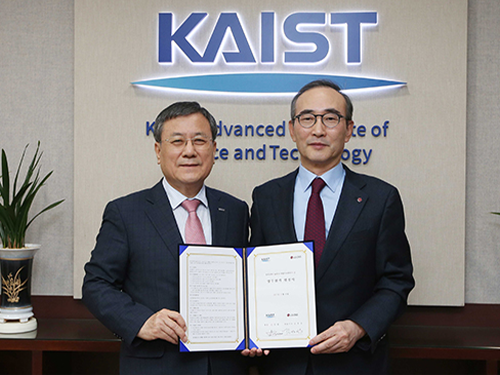 Strengthening Industry-Academia Cooperation with LG CNS
On November 20, KAIST signed an MoU with LG CNS for industry-academia partnership in education, research, and business in the fields of AI and Big Data. Rather than simply developing education programs or supporting industry-academia scholarships, both organizations agreed to carry out a joint research project on AI and Big Data that can be applied to practical business.
KAIST will collaborate with LG CNS in the fields of smart factories, customer analysis, and supply chain management analysis.
Not only will LG CNS offer internships to KAIST students, but it also will support professors and students who propose innovative startup ideas for AI and Big Data. Offering an industry-academia scholarship for graduate students is also being discussed. Together with LG CNS, KAIST will put its efforts into propose projects regarding AI and Big Data in the public sector.
Furthermore, KAIST and LG CNS will jointly explore and carry out industry-academia projects that could be practically used in business. Both will carry out the project vigorously through strong cooperation; for instance, LG CNS employees can be assigned to KAIST, if necessary. Also, LG CNS’s AI and Big Data platform, called DAP (Data Analytics & AI Platform) will be used as a data analysis tool during the project and the joint outcomes will be installed in DAP.
KAIST professors with expertise in AI deep learning have trained LG CNS employees since the Department of Industrial & Systems Engineering established ‘KAIST AI Academy’ in LG CNS last August.
“With KAIST, the best research-centered university in Korea, we will continue to lead in developing the field of AI and Big Data and provide innovative services that create value by connecting them to customer business,” Yong Shub Kim, the CEO of LG CNS, highlighted.
2017.11.22 View 12070
Strengthening Industry-Academia Cooperation with LG CNS
On November 20, KAIST signed an MoU with LG CNS for industry-academia partnership in education, research, and business in the fields of AI and Big Data. Rather than simply developing education programs or supporting industry-academia scholarships, both organizations agreed to carry out a joint research project on AI and Big Data that can be applied to practical business.
KAIST will collaborate with LG CNS in the fields of smart factories, customer analysis, and supply chain management analysis.
Not only will LG CNS offer internships to KAIST students, but it also will support professors and students who propose innovative startup ideas for AI and Big Data. Offering an industry-academia scholarship for graduate students is also being discussed. Together with LG CNS, KAIST will put its efforts into propose projects regarding AI and Big Data in the public sector.
Furthermore, KAIST and LG CNS will jointly explore and carry out industry-academia projects that could be practically used in business. Both will carry out the project vigorously through strong cooperation; for instance, LG CNS employees can be assigned to KAIST, if necessary. Also, LG CNS’s AI and Big Data platform, called DAP (Data Analytics & AI Platform) will be used as a data analysis tool during the project and the joint outcomes will be installed in DAP.
KAIST professors with expertise in AI deep learning have trained LG CNS employees since the Department of Industrial & Systems Engineering established ‘KAIST AI Academy’ in LG CNS last August.
“With KAIST, the best research-centered university in Korea, we will continue to lead in developing the field of AI and Big Data and provide innovative services that create value by connecting them to customer business,” Yong Shub Kim, the CEO of LG CNS, highlighted.
2017.11.22 View 12070 -
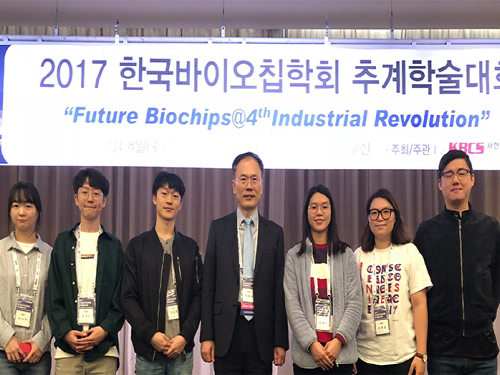 Professor Je-Kyun Park, Awarded by The Korean BioChip Society
On November 9, Je-Kyun Park from the Department of Bio and Brain Engineering at KAIST received an award from the 2017 Fall Meeting of The Korean BioChip Society held in Paradise Hotel Busan, Korea. This year’s meeting recognized Professor Park for developing lab-on-a-chip and microfluidic analytical technologies.
The Korean BioChip Society is a corporation of biochip professional established in 2006 for the development of biochip technology. Every year, the Society selects a recipient based on the nominees’ academic achievements and contributions to bio-fusion industry.
Professor Park served on the international editorial boards of renowned international journals in related fields, including Biosensors and Bioelectronics and Lab on a Chip. He was also the Committee Chairman of MicroTas in 2015.
2017.11.22 View 8921
Professor Je-Kyun Park, Awarded by The Korean BioChip Society
On November 9, Je-Kyun Park from the Department of Bio and Brain Engineering at KAIST received an award from the 2017 Fall Meeting of The Korean BioChip Society held in Paradise Hotel Busan, Korea. This year’s meeting recognized Professor Park for developing lab-on-a-chip and microfluidic analytical technologies.
The Korean BioChip Society is a corporation of biochip professional established in 2006 for the development of biochip technology. Every year, the Society selects a recipient based on the nominees’ academic achievements and contributions to bio-fusion industry.
Professor Park served on the international editorial boards of renowned international journals in related fields, including Biosensors and Bioelectronics and Lab on a Chip. He was also the Committee Chairman of MicroTas in 2015.
2017.11.22 View 8921 -
 WEF-KAIST to Host a Forum Next April in Korea
(President Shin poses with Chairman Schwab at the meeting in Dubai)
President Sung-Chul Shin and Executive Chairman Klaus Schwab of the World Economic Forum agreed to co-host the Fourth Industrial Revolution Forum next April in Seoul during a meeting at the WEF Global Future Councils 2017 held in Dubai November 11-12.
Next April’s forum will be a follow-up event of the roundtable discussion KAIST and the WEF Center for the Fourth Industrial Revolution co-hosted in October in Seoul. The two hosted the roundtable discussion titled “Mastering the Fourth Industrial Revolution: The Future of Jobs and Inclusive Growth in Korea.”
During the annual meeting in Dubai, Chairman Schwab expressed his deep appreciation to President Shin for hosting the roundtable discussion and proposed a full-fledged forum in partnership with KAIST once again, which Chairman Schwab will be scheduled to attend.
Chairman Schwab emphasized once again that Korea, who has the world’s top high-end technologies such as 5G telecommunications and semiconductor memory, will be the best fit to realize the Fourth Industrial Revolution most rapidly. He also expressed his great interest in the city of Daejeon in which is being considered to become the Special City for the Fourth Industrial Revolution.
The Global Future Council of the WEF is the interdisciplinary knowledge network dedicated to promoting innovative thinking on the future. The annual council convenes in Dubai the most relevant and knowledgeable thought leaders from academia, government, business, and civil society to challenge conventional thinking and develop new insights and perspectives on key global systems, as well as the impact and governance of key emerging technologies. This year, more than 850 world-leading experts from 74 countries participated.
Under the theme of ‘Vision 2030,’ participants explored systematic changes in key areas such as energy, mobility, and infrastructure while reflecting on the impact of technological breakthroughs in artificial intelligence, biotechnology, and other areas related to the Fourth Industrial Revolution.
2017.11.13 View 9797
WEF-KAIST to Host a Forum Next April in Korea
(President Shin poses with Chairman Schwab at the meeting in Dubai)
President Sung-Chul Shin and Executive Chairman Klaus Schwab of the World Economic Forum agreed to co-host the Fourth Industrial Revolution Forum next April in Seoul during a meeting at the WEF Global Future Councils 2017 held in Dubai November 11-12.
Next April’s forum will be a follow-up event of the roundtable discussion KAIST and the WEF Center for the Fourth Industrial Revolution co-hosted in October in Seoul. The two hosted the roundtable discussion titled “Mastering the Fourth Industrial Revolution: The Future of Jobs and Inclusive Growth in Korea.”
During the annual meeting in Dubai, Chairman Schwab expressed his deep appreciation to President Shin for hosting the roundtable discussion and proposed a full-fledged forum in partnership with KAIST once again, which Chairman Schwab will be scheduled to attend.
Chairman Schwab emphasized once again that Korea, who has the world’s top high-end technologies such as 5G telecommunications and semiconductor memory, will be the best fit to realize the Fourth Industrial Revolution most rapidly. He also expressed his great interest in the city of Daejeon in which is being considered to become the Special City for the Fourth Industrial Revolution.
The Global Future Council of the WEF is the interdisciplinary knowledge network dedicated to promoting innovative thinking on the future. The annual council convenes in Dubai the most relevant and knowledgeable thought leaders from academia, government, business, and civil society to challenge conventional thinking and develop new insights and perspectives on key global systems, as well as the impact and governance of key emerging technologies. This year, more than 850 world-leading experts from 74 countries participated.
Under the theme of ‘Vision 2030,’ participants explored systematic changes in key areas such as energy, mobility, and infrastructure while reflecting on the impact of technological breakthroughs in artificial intelligence, biotechnology, and other areas related to the Fourth Industrial Revolution.
2017.11.13 View 9797 -
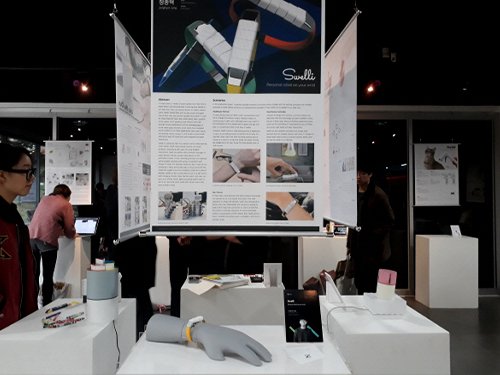 IDKAIST Graduation Show, Interative and Innovative Works
Undergraduate students from the Department of Industrial Design at KAIST opened up their graduation show in the Industrial Design Building for eight days in KAIST from November 10 and another four days in Coex, Seoul from December 7.
The students showcased their creative and novel works in the exhibition. Some designs successfully showed change concepts such as for mixing straws. There were also several projects designed to meet individual demand, such as a customized shoe-making application and personal makeup colorings.
Since the establishment of its undergraduate program in 1983, the department has held a graduation show to demonstrate four years of the students’ academic work and research performance to KAIST members, externals specialists, and the public.
Professor Daniel Saakes, who is in charge of the show, said, “Please come by the show and support the 28 students for their hard work. This year, students’ projects are more socially-oriented through applications and social media, making them easily approachable for consumers.”
2017.11.13 View 7108
IDKAIST Graduation Show, Interative and Innovative Works
Undergraduate students from the Department of Industrial Design at KAIST opened up their graduation show in the Industrial Design Building for eight days in KAIST from November 10 and another four days in Coex, Seoul from December 7.
The students showcased their creative and novel works in the exhibition. Some designs successfully showed change concepts such as for mixing straws. There were also several projects designed to meet individual demand, such as a customized shoe-making application and personal makeup colorings.
Since the establishment of its undergraduate program in 1983, the department has held a graduation show to demonstrate four years of the students’ academic work and research performance to KAIST members, externals specialists, and the public.
Professor Daniel Saakes, who is in charge of the show, said, “Please come by the show and support the 28 students for their hard work. This year, students’ projects are more socially-oriented through applications and social media, making them easily approachable for consumers.”
2017.11.13 View 7108 -
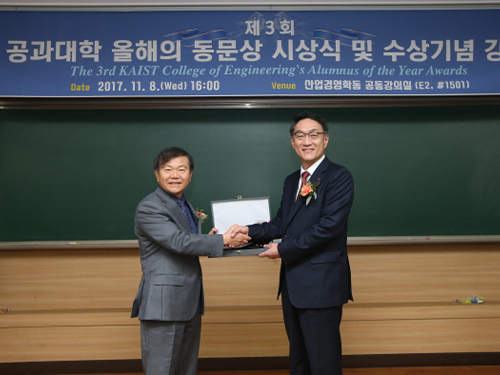 LG's Woo Jong Lee Named the Alumnus of College of Engineering
The College of Engineering at KAIST selected Woo Jong Lee, President and Head of the VC Business Division at LG Electronics Inc., as the 2017 Alumnus of the Year for the College of Engineering.
‘Alumnus of the Year’ is an award given to a distinguished alumnus who has contributed to the development of industrial technology or made outstanding academic achievements.
Lee graduated from KAIST with the master’s degrees in Industrial Engineering. He also worked at Daewoo Motors as an executive member in the development division. He has been a crucial human resource for LG since he joined the company in 2000.
While leading the VC business Division, which was established in 2013, Lee is recognized as a creative engineer as well as a leader in the automotive industry. Focusing on autonomous driving and eco-friendliness, he has been engaged in the production of major projects from the beginning to the end.
Since 2014, outstanding alumni whose achievements have represented KAIST at the highest level have received the award. The first recipient was Tae-Kyung Yoo, an executive at Lumens Co., Ltd., and the second recipient was Jung-Ju Kim, the founder of NXC. In 2016, the award was not given because an appropriate candidate could not be identified.
The award was held in the Industrial Engineering & Management Building (E2) on November 8. Faculty members including the dean of the College of Engineering Jong-Hwan Kim, the vice dean Hyochoong Bang, the head of Industrial & Systems Engineering Taesik Lee, and the dean of the KAIST Academy Tae-Eog Lee attended the ceremony.
After the ceremony, Lee delivered a lecture on ‘Auto-components Business of LG Electronics’ to KAIST students.
2017.11.09 View 9150
LG's Woo Jong Lee Named the Alumnus of College of Engineering
The College of Engineering at KAIST selected Woo Jong Lee, President and Head of the VC Business Division at LG Electronics Inc., as the 2017 Alumnus of the Year for the College of Engineering.
‘Alumnus of the Year’ is an award given to a distinguished alumnus who has contributed to the development of industrial technology or made outstanding academic achievements.
Lee graduated from KAIST with the master’s degrees in Industrial Engineering. He also worked at Daewoo Motors as an executive member in the development division. He has been a crucial human resource for LG since he joined the company in 2000.
While leading the VC business Division, which was established in 2013, Lee is recognized as a creative engineer as well as a leader in the automotive industry. Focusing on autonomous driving and eco-friendliness, he has been engaged in the production of major projects from the beginning to the end.
Since 2014, outstanding alumni whose achievements have represented KAIST at the highest level have received the award. The first recipient was Tae-Kyung Yoo, an executive at Lumens Co., Ltd., and the second recipient was Jung-Ju Kim, the founder of NXC. In 2016, the award was not given because an appropriate candidate could not be identified.
The award was held in the Industrial Engineering & Management Building (E2) on November 8. Faculty members including the dean of the College of Engineering Jong-Hwan Kim, the vice dean Hyochoong Bang, the head of Industrial & Systems Engineering Taesik Lee, and the dean of the KAIST Academy Tae-Eog Lee attended the ceremony.
After the ceremony, Lee delivered a lecture on ‘Auto-components Business of LG Electronics’ to KAIST students.
2017.11.09 View 9150 -
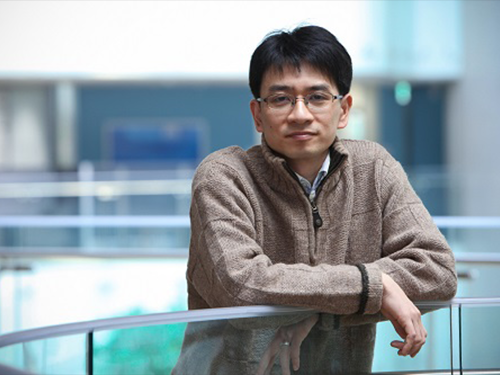 Professor Lee's Research Selected as Top 100 National R&D Projects
A research project, led by Research Professor Ju Yong Lee from the KAIST Institute for IT Convergence, was selected as one of the Top 100 National Research and Development Projects 2017.
This research project, titled LTE-A-based Single RF Small Base Station supporting Multiple Streams, developed 300Mbps low power, low complexity and broadband small base station technology that supports 4x4 MIMO (Multiple Input and Multiple Output) by proposing a new antenna structure and a new RF (Radio Frequency) structure based on LTE-A. Professors from the School of Electrical Engineering at KAIST, Dong Ho Cho, Songcheol Hong, and Yong Hoon Lee also collaborated on the project.
The existing heterodyne method of communication systems generates the problems of increasing unit price and system complexity.
In this project, however, Professor Lee directly modulated the baseband signal from the RF stage through an impedance loading-based RF chip. This method was designed to facilitate low power as well as low complexity while supporting broadband service. Based on this, his team developed source technology for RF that can be applied to fourth and even fifth generation networks.
Furthermore, this base station is smallest among the small-cell stations so far, providing an eco-friendly installation environment. It contributes to the market for fifth generation mobile communications by reducing power consumption significantly yet providing high-capacity services.
Professor Lee said, “This technology will contribute to creating a new market and additional jobs because business based on the fifth mobile generation can provide multi-functional services, including multiband. Requiring low power and providing high-capacity services anywhere at any time will enhance national competence and reduce costs for establishing a next generation mobile communication system. It is expected that this technology will help with disseminating mobile communication infrastructure through expanding information and communication system as well as the infrastructure of island areas.”
2017.11.08 View 9608
Professor Lee's Research Selected as Top 100 National R&D Projects
A research project, led by Research Professor Ju Yong Lee from the KAIST Institute for IT Convergence, was selected as one of the Top 100 National Research and Development Projects 2017.
This research project, titled LTE-A-based Single RF Small Base Station supporting Multiple Streams, developed 300Mbps low power, low complexity and broadband small base station technology that supports 4x4 MIMO (Multiple Input and Multiple Output) by proposing a new antenna structure and a new RF (Radio Frequency) structure based on LTE-A. Professors from the School of Electrical Engineering at KAIST, Dong Ho Cho, Songcheol Hong, and Yong Hoon Lee also collaborated on the project.
The existing heterodyne method of communication systems generates the problems of increasing unit price and system complexity.
In this project, however, Professor Lee directly modulated the baseband signal from the RF stage through an impedance loading-based RF chip. This method was designed to facilitate low power as well as low complexity while supporting broadband service. Based on this, his team developed source technology for RF that can be applied to fourth and even fifth generation networks.
Furthermore, this base station is smallest among the small-cell stations so far, providing an eco-friendly installation environment. It contributes to the market for fifth generation mobile communications by reducing power consumption significantly yet providing high-capacity services.
Professor Lee said, “This technology will contribute to creating a new market and additional jobs because business based on the fifth mobile generation can provide multi-functional services, including multiband. Requiring low power and providing high-capacity services anywhere at any time will enhance national competence and reduce costs for establishing a next generation mobile communication system. It is expected that this technology will help with disseminating mobile communication infrastructure through expanding information and communication system as well as the infrastructure of island areas.”
2017.11.08 View 9608 -
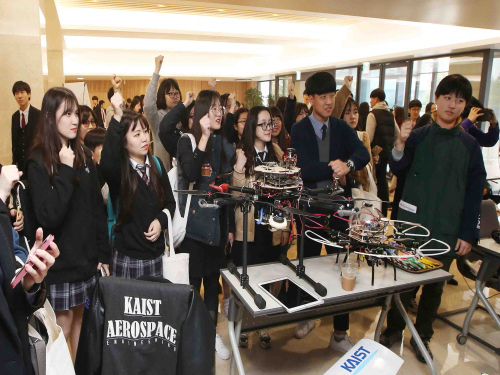 KAST Opened the Campus to the Public
KAIST hosted OPEN KAIST 2017 on the main campus from November 2 to 3, 2017. OPEN KAIST is a science and cultural event designed for students and the general public to experience and take a glance at research labs.
More than 10,000 visitors came to KAIST this year. Groups of families and students came to KAIST to experience various programs related to science.
Twenty departments, including Mechanical Engineering, Aerospace Engineering, the Graduate School of Cultural Technology, and Materials Science and Engineering participated in the event, along with three research centers and the Public Relations Office.
The event was composed of a total of 70 programs in four sections: lab tour, research performance exhibition, department introduction, and special lectures.
The kick off activity for the event was a trial game of the AI World Cup 2017 which will be hosted by KAIST in December 2017. Many people also visited the mobile health care showroom where they could experience what a future smart home and hospital would look like. It was also interesting to visit a futuristic living space for one-person households that provides virtual reality services.
KAIST hopes that the event offers an opportunity for children and students to get to know about science better. Professor Jong-Hwan Kim, the Dean of the College of Engineering at KAIST said, “OPEN KAIST is the one and only opportunity to visit and experience our research labs. KAIST will make every effort to take a step closer to the public by focusing on research that contributes to human society.”
2017.11.06 View 7625
KAST Opened the Campus to the Public
KAIST hosted OPEN KAIST 2017 on the main campus from November 2 to 3, 2017. OPEN KAIST is a science and cultural event designed for students and the general public to experience and take a glance at research labs.
More than 10,000 visitors came to KAIST this year. Groups of families and students came to KAIST to experience various programs related to science.
Twenty departments, including Mechanical Engineering, Aerospace Engineering, the Graduate School of Cultural Technology, and Materials Science and Engineering participated in the event, along with three research centers and the Public Relations Office.
The event was composed of a total of 70 programs in four sections: lab tour, research performance exhibition, department introduction, and special lectures.
The kick off activity for the event was a trial game of the AI World Cup 2017 which will be hosted by KAIST in December 2017. Many people also visited the mobile health care showroom where they could experience what a future smart home and hospital would look like. It was also interesting to visit a futuristic living space for one-person households that provides virtual reality services.
KAIST hopes that the event offers an opportunity for children and students to get to know about science better. Professor Jong-Hwan Kim, the Dean of the College of Engineering at KAIST said, “OPEN KAIST is the one and only opportunity to visit and experience our research labs. KAIST will make every effort to take a step closer to the public by focusing on research that contributes to human society.”
2017.11.06 View 7625 -
 College of Business Honored with the WRDS-SSNR Innovation Award
(Professor Inmoo Lee (far left), Robert Zarazowski (WRDS), Gregg Gordon (SSRN) and Professor Jae Kyu Lee)
The KAIST College of Business received the WRDS (Wharton Research Data Services)-SSNR Innovation Award for the Asia-Pacific region on October 31 during the AACSB Asia-Pacific Conference in Seoul.
The WRDS-SSRN Innovation Award is intended to elevate the visibility of pioneering research across a broad range of financial and economic topics. Three winners are selected annually from across North America, Europe, and the Asia Pacific based on their ability to demonstrate innovation and research excellence.
The award was created through collaboration with SSRN, the world’s leading early-stage research platform and Elsevier, a global information analytics company specializing in science and health. It honors top business schools that produce exceptional data-driven research. A part of the Wharton School of the University of Pennsylvania, WRDS provides global corporations, universities, and regulatory agencies with the thought leadership, data access, and analytics needed to enable impactful research.
The Dean of the College of Business Youngbae Kim, said that KAIST has been taking the lead in responding to global trends, offering many innovative programs such as an MBA for Social Entrepreneurship and the Master Course for Green Growth Management. KAIST already has been selected as the Most Innovative University in the Asia-Pacific Region by Thomson Reuters for the last two years.
Robert Zarazowski, managing director of WRDS said they recognize and support the outstanding achievement taking place at KAIST as well as its commitment to growth and innovation in business education.
2017.11.03 View 7491
College of Business Honored with the WRDS-SSNR Innovation Award
(Professor Inmoo Lee (far left), Robert Zarazowski (WRDS), Gregg Gordon (SSRN) and Professor Jae Kyu Lee)
The KAIST College of Business received the WRDS (Wharton Research Data Services)-SSNR Innovation Award for the Asia-Pacific region on October 31 during the AACSB Asia-Pacific Conference in Seoul.
The WRDS-SSRN Innovation Award is intended to elevate the visibility of pioneering research across a broad range of financial and economic topics. Three winners are selected annually from across North America, Europe, and the Asia Pacific based on their ability to demonstrate innovation and research excellence.
The award was created through collaboration with SSRN, the world’s leading early-stage research platform and Elsevier, a global information analytics company specializing in science and health. It honors top business schools that produce exceptional data-driven research. A part of the Wharton School of the University of Pennsylvania, WRDS provides global corporations, universities, and regulatory agencies with the thought leadership, data access, and analytics needed to enable impactful research.
The Dean of the College of Business Youngbae Kim, said that KAIST has been taking the lead in responding to global trends, offering many innovative programs such as an MBA for Social Entrepreneurship and the Master Course for Green Growth Management. KAIST already has been selected as the Most Innovative University in the Asia-Pacific Region by Thomson Reuters for the last two years.
Robert Zarazowski, managing director of WRDS said they recognize and support the outstanding achievement taking place at KAIST as well as its commitment to growth and innovation in business education.
2017.11.03 View 7491 -
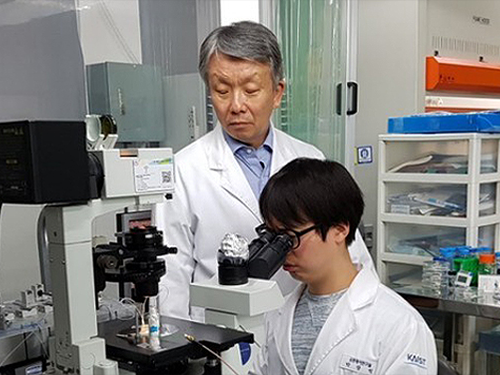 Scientist of November, Professor Hyung Jin Sung
Professor Hyung Jin Sung from the Department of Mechanical Engineering at KAIST received a ‘Science and Technology Award of the Month’ given by the Ministry of ICT and Science and the National Research Foundation of Korea for November 2017. He developed technology that can exquisitely control a micrometer-scaled liquid drop on a dime-sized lab-on-a-chip. With his work, he was recognized for reinforcing research capability on microfluidics.
Lab-on-a-chip is an emerging experiment and diagnostic technology in the form of a bio-microchip that facilitates complex and various experiments with only a minimal sample size required. This technology draws a lot of attention not only from medical and pharmaceutical areas, but also the health and environmental field. The biggest problem was that technology for the temperature control of a fluid sample, which is one of the core technologies in microfluidics, has low accuracy. This limit had to be overcome in order to use the lab-on-a-chip more widely.
Professor Sung developed an acoustic and thermal method which controls the temperature of a droplet quickly and meticulously by using sound and energy. This is a thermal method that uses heat generated during the absorption of an acoustic wave into viscoelastic substances. It facilitates a rapid heating rate and spatial-temporal temperature control, allowing heating in desired areas. In addition, Professor Sung applied his technology to polymerase chain reactions, which are used to amplify DNA.
Through this experiment, he successfully shortened the reaction time from 1-2 hours to only three minutes, making this a groundbreaking achievement.
Professor Sung said, “My research is significant for enhancing the applicability of microfluidics. I expect that it will lead to technological innovations in healthcare fields including biochemistry, medical checkups, and new medicine development.”
2017.11.03 View 10563
Scientist of November, Professor Hyung Jin Sung
Professor Hyung Jin Sung from the Department of Mechanical Engineering at KAIST received a ‘Science and Technology Award of the Month’ given by the Ministry of ICT and Science and the National Research Foundation of Korea for November 2017. He developed technology that can exquisitely control a micrometer-scaled liquid drop on a dime-sized lab-on-a-chip. With his work, he was recognized for reinforcing research capability on microfluidics.
Lab-on-a-chip is an emerging experiment and diagnostic technology in the form of a bio-microchip that facilitates complex and various experiments with only a minimal sample size required. This technology draws a lot of attention not only from medical and pharmaceutical areas, but also the health and environmental field. The biggest problem was that technology for the temperature control of a fluid sample, which is one of the core technologies in microfluidics, has low accuracy. This limit had to be overcome in order to use the lab-on-a-chip more widely.
Professor Sung developed an acoustic and thermal method which controls the temperature of a droplet quickly and meticulously by using sound and energy. This is a thermal method that uses heat generated during the absorption of an acoustic wave into viscoelastic substances. It facilitates a rapid heating rate and spatial-temporal temperature control, allowing heating in desired areas. In addition, Professor Sung applied his technology to polymerase chain reactions, which are used to amplify DNA.
Through this experiment, he successfully shortened the reaction time from 1-2 hours to only three minutes, making this a groundbreaking achievement.
Professor Sung said, “My research is significant for enhancing the applicability of microfluidics. I expect that it will lead to technological innovations in healthcare fields including biochemistry, medical checkups, and new medicine development.”
2017.11.03 View 10563 -
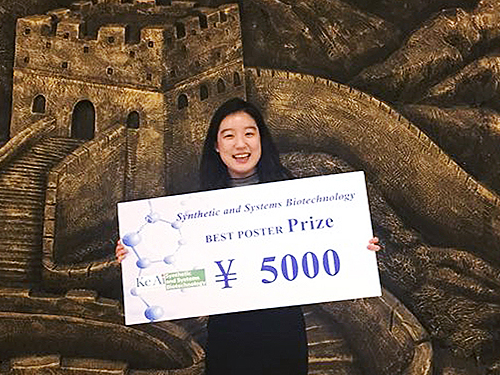 In Jin Cho Earned the Best Poster Prize at ME Summit 2017
In Jin Cho, a Ph.D. student in the Department of Chemical and Biomolecular Engineering at KAIST received the best poster prize at the International Metabolic Engineering Summit 2017 held on October 24 in Beijing, China.
The International Metabolic Engineering Summit is a global conference where scientists and corporate researchers in the field of metabolic engineering present their latest research outcomes and build networks.
At this year’s summit, about 500 researchers from around the world participated in active academic exchanges, including giving keynote speeches and presenting posters.
During the poster session, the summit selects one person for the KeAi-synthetic and Systems Biotechnology Poster Award, two for Microbial Cell Factories Poster Awards, and three for Biotechnology Journal Poster Awards among the posters presented by graduate students, post-doctoral fellows and researchers. Cho received the KeAi-synthetic and Systems Biotechnology Poster Award. Her winning poster is on the biotransformation of p-xylene to terephthalic acid using engineered Escherichia coli.
Terephthalic acid is generally produced by p-xylene oxidation; however, this process requires a high temperature and pressure as well as a toxic catalyst during the reaction process.
Cho and Ziwei Luo, a Ph.D. student at KAIST, co-conducted the research and developed a successful biological conversion process. Compared to the existing chemical process, it does not require a high temperature and pressure; and it is environmentally friendly with a relatively high conversion rate of approximately 97%.
Cho’s advisor, Distinguished Professor Sang Yup Lee said, “Further research on glucose-derived terephthalic acid will enable us to produce biomass-based eco-friendly terephthalic acid through engineered Escherichia coli.”
2017.10.31 View 10541
In Jin Cho Earned the Best Poster Prize at ME Summit 2017
In Jin Cho, a Ph.D. student in the Department of Chemical and Biomolecular Engineering at KAIST received the best poster prize at the International Metabolic Engineering Summit 2017 held on October 24 in Beijing, China.
The International Metabolic Engineering Summit is a global conference where scientists and corporate researchers in the field of metabolic engineering present their latest research outcomes and build networks.
At this year’s summit, about 500 researchers from around the world participated in active academic exchanges, including giving keynote speeches and presenting posters.
During the poster session, the summit selects one person for the KeAi-synthetic and Systems Biotechnology Poster Award, two for Microbial Cell Factories Poster Awards, and three for Biotechnology Journal Poster Awards among the posters presented by graduate students, post-doctoral fellows and researchers. Cho received the KeAi-synthetic and Systems Biotechnology Poster Award. Her winning poster is on the biotransformation of p-xylene to terephthalic acid using engineered Escherichia coli.
Terephthalic acid is generally produced by p-xylene oxidation; however, this process requires a high temperature and pressure as well as a toxic catalyst during the reaction process.
Cho and Ziwei Luo, a Ph.D. student at KAIST, co-conducted the research and developed a successful biological conversion process. Compared to the existing chemical process, it does not require a high temperature and pressure; and it is environmentally friendly with a relatively high conversion rate of approximately 97%.
Cho’s advisor, Distinguished Professor Sang Yup Lee said, “Further research on glucose-derived terephthalic acid will enable us to produce biomass-based eco-friendly terephthalic acid through engineered Escherichia coli.”
2017.10.31 View 10541 -
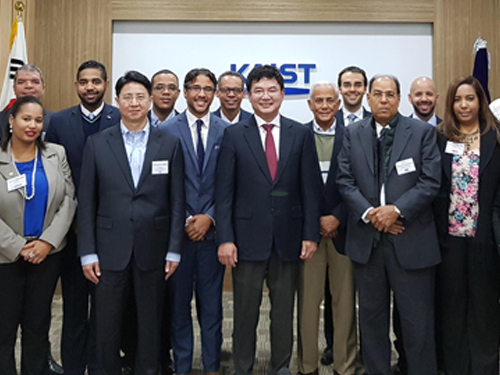 KAIST and KOICA Invited Dominican Republic Officials for Workshop
KAIST will host a two-week workshop for Dominican Republic officials and scholars in collaboration with KOICA (Korea International Cooperation Agency) beginning October 23 at KAIST.
The workshop aims to encourage academia-industry cooperation as one of the Projects for Human Resource Development for Science and Technology at KOICA. Dominican participants including the assistant minister of the Ministry of Higher Education, Science and Technology (MESCYT) and deans of engineering colleges at major universities will enjoy lectures from experts and visit enterprises known for excellent academia-industry collaboration.
According to the Center for Overseas Development, at which Professor WonJoon Kim in the School of Business and Technology Management at KAIST holds the position of director, the workshop is designed to develop human resources in the science and technology (S&T) area, share knowledge on research and development in the field of academia-industry cooperation, and help the participants acquire know-how for managing partnerships between related organizations and industries.
During the workshop, KAIST plans to transfer know-how and share knowledge on its academia-industry cooperation R&D system, in hopes that the workshop will help the Dominican Republic foster its manpower in higher education. The workshop organizers hope that the officers and scholars will be able to apply what they will learn for establishing and carrying out detailed action plans for academia-industry cooperation policies in an effective manner.
“This workshop provides an opportunity to learn about the development of S&T in Korea, academia-industry cooperation R&D, and fostering manpower in advanced S&T. Through the knowledge sharing, we can have a better understanding of academia-industry cooperation as well as education on advanced manpower,” said Pedro Antonio Eduardo, the assistant minister of MESCYT.
He added, “I hope that this workshop will further detailed cooperation between the two countries for Korean high-tech enterprises’ overseas expansion and advanced manpower education. The development model in Korea has many essential elements, so learning its engine for growth and polytechnic manpower education will help develop my country’s industry sector.”
The Project for Human Resource Development for Science and Technology is one of the official development assistance projects running from last year until 2019. It promotes R&D activities for S&T in the Dominican Republic, encouraging academia-industry cooperation by improving trainers in charge of advanced manpower education.
2017.10.30 View 8494
KAIST and KOICA Invited Dominican Republic Officials for Workshop
KAIST will host a two-week workshop for Dominican Republic officials and scholars in collaboration with KOICA (Korea International Cooperation Agency) beginning October 23 at KAIST.
The workshop aims to encourage academia-industry cooperation as one of the Projects for Human Resource Development for Science and Technology at KOICA. Dominican participants including the assistant minister of the Ministry of Higher Education, Science and Technology (MESCYT) and deans of engineering colleges at major universities will enjoy lectures from experts and visit enterprises known for excellent academia-industry collaboration.
According to the Center for Overseas Development, at which Professor WonJoon Kim in the School of Business and Technology Management at KAIST holds the position of director, the workshop is designed to develop human resources in the science and technology (S&T) area, share knowledge on research and development in the field of academia-industry cooperation, and help the participants acquire know-how for managing partnerships between related organizations and industries.
During the workshop, KAIST plans to transfer know-how and share knowledge on its academia-industry cooperation R&D system, in hopes that the workshop will help the Dominican Republic foster its manpower in higher education. The workshop organizers hope that the officers and scholars will be able to apply what they will learn for establishing and carrying out detailed action plans for academia-industry cooperation policies in an effective manner.
“This workshop provides an opportunity to learn about the development of S&T in Korea, academia-industry cooperation R&D, and fostering manpower in advanced S&T. Through the knowledge sharing, we can have a better understanding of academia-industry cooperation as well as education on advanced manpower,” said Pedro Antonio Eduardo, the assistant minister of MESCYT.
He added, “I hope that this workshop will further detailed cooperation between the two countries for Korean high-tech enterprises’ overseas expansion and advanced manpower education. The development model in Korea has many essential elements, so learning its engine for growth and polytechnic manpower education will help develop my country’s industry sector.”
The Project for Human Resource Development for Science and Technology is one of the official development assistance projects running from last year until 2019. It promotes R&D activities for S&T in the Dominican Republic, encouraging academia-industry cooperation by improving trainers in charge of advanced manpower education.
2017.10.30 View 8494